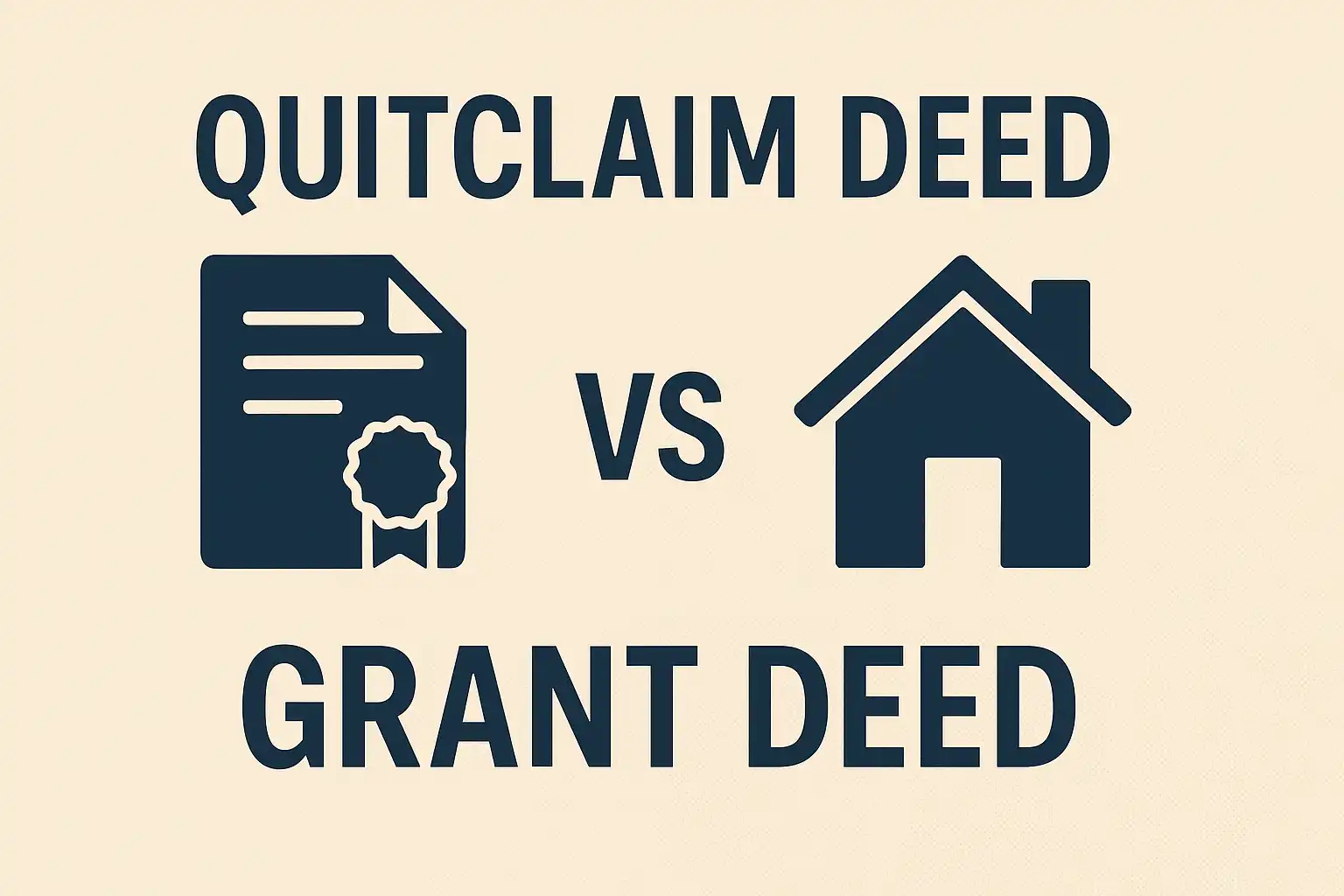
When transferring real estate in western states, property owners often face a crucial decision between using a quitclaim deed or a grant deed. While both accomplish property transfers, they offer dramatically different levels of legal protection and serve distinct purposes. This comprehensive analysis examines the key differences, legal implications, and strategic considerations to help you choose the right deed type for your specific situation.
Quick Comparison Overview
| Aspect | Quitclaim Deed | Grant Deed |
|---|---|---|
| Legal Protection | No warranties or guarantees | Limited warranties provided |
| Title Insurance | Usually required | May reduce title insurance needs |
| Best Use Cases | Family transfers, title cleanup | Arms-length sales, refinancing |
| Risk Level | Higher risk to grantee | Moderate risk to grantee |
| Cost | Lower preparation costs | Moderate preparation costs |
| Complexity | Simple documentation | More complex legal language |
| Common States | All 50 states | Primarily western states |
Understanding Quitclaim Deeds: The Basics
Definition and Legal Framework
A quitclaim deed transfers whatever ownership interest the grantor possesses in a property without making any warranties or guarantees about the quality of that title. The grantor essentially says, “I’m giving you whatever rights I have, if any, but I’m not promising anything about what those rights actually are.”
According to the American Bar Association’s Real Property Section, quitclaim deeds provide the simplest method of property transfer but offer the least protection to the recipient.
Key Characteristics of Quitclaim Deeds
No Title Warranties: The grantor makes no promises about having clear title or the right to transfer the property.
Present Interest Only: Transfers only the interest the grantor currently possesses, which could be complete ownership, partial ownership, or no ownership at all.
No Future Protection: Provides no protection against future title claims or defects that may arise.
Immediate Transfer: Takes effect immediately upon proper execution and recording, subject to any existing liens or encumbrances.
When Quitclaim Deeds Are Appropriate
Family Transfers: Adding spouses to title, transferring property between family members, or estate planning transfers where trust exists between parties.
Title Cleanup: Removing clouds on title, correcting minor errors, or clearing potential claims from parties who may have questionable interests.
Divorce Situations: Transferring property between divorcing spouses as part of settlement agreements.
Entity Changes: Transferring property between related business entities or trusts.
Quick Transfers: Situations requiring fast completion without extensive title examination.
Understanding Grant Deeds: Enhanced Protection
Definition and Legal Framework
A grant deed, also known as a limited warranty deed in some jurisdictions, provides specific warranties from the grantor to the grantee regarding the property’s title. While not as comprehensive as a general warranty deed, it offers meaningful protection against certain title defects.
Key Warranties in Grant Deeds
Warranty of Authority: The grantor warrants they have the legal authority to transfer the property and that the title being conveyed is the title they actually possess.
Warranty Against Encumbrances: The grantor warrants that they have not created any undisclosed liens, encumbrances, or restrictions on the property during their ownership period.
Covenant of Further Assurance: The grantor agrees to take reasonable steps to perfect the title if defects are discovered later.
Present Title Guarantee: Unlike quitclaim deeds, grant deeds guarantee that the grantor actually possesses the title interest being transferred.
Limited Nature of Grant Deed Protection
Time Limitation: Grant deed warranties typically cover only the period during which the grantor owned the property, not the entire chain of title.
Specific Warranties Only: Protection is limited to the specific warranties stated in the deed, unlike general warranty deeds that provide comprehensive coverage.
Known Exceptions: Grant deeds typically exclude known liens, easements, and restrictions that are disclosed in the deed or public records.
According to the California Civil Code Section 1113, grant deeds in California automatically include implied warranties even when not explicitly stated in the deed language.
State-by-State Usage Patterns
Western States (Primary Grant Deed Usage)
California: Grant deeds are the standard for most property transfers, with specific statutory language and implied warranties.
Nevada: Uses both grant deeds and quitclaim deeds, with grant deeds preferred for sales transactions.
Arizona: Grant deeds common for arms-length transactions, quitclaim deeds for family transfers.
Colorado: Both deed types used, with grant deeds providing statutory warranties under state law.
Utah: Grant deeds standard for sales, with specific statutory protections for grantees.
Regional Variations
Texas: Primarily uses general warranty deeds and special warranty deeds rather than grant deeds.
Florida: Uses warranty deeds and quitclaim deeds, with limited use of grant-type deeds.
New York: Primarily uses bargain and sale deeds and quitclaim deeds for different transaction types.
Illinois: Uses warranty deeds and quitclaim deeds as primary transfer instruments.
Risk Analysis: Protection Levels Compared
Quitclaim Deed Risk Factors
Unknown Title Defects: The grantee receives no protection against existing liens, judgments, or other title problems.
Fraudulent Transfers: No recourse if the grantor lacked authority to transfer the property.
Future Claims: No protection against third-party claims that may arise after the transfer.
Marketability Issues: Properties transferred by quitclaim deed may be harder to sell or refinance due to title concerns.
Grant Deed Risk Mitigation
Limited Warranty Protection: Specific warranties provide legal recourse against the grantor for certain title defects.
Enhanced Marketability: Properties with grant deed transfers are generally more acceptable to lenders and title companies.
Reduced Title Insurance Premiums: Some title companies offer reduced premiums for properties with grant deed protection.
Legal Recourse: Clear legal remedies available against grantors who breach deed warranties.
Residual Risks for Both Deed Types
Prior Owner Issues: Neither deed type protects against title defects created by previous owners outside the warranty period.
Public Record Errors: Recording errors or fraudulent documents in the public record can affect both deed types.
Government Actions: Neither deed type protects against future government actions like eminent domain or tax foreclosures.
Financial and Legal Implications
Title Insurance Considerations
Quitclaim Deed Scenarios: Title insurance is almost always necessary and may be more expensive due to increased risk.
Grant Deed Scenarios: Title insurance remains important but may cost less due to the grantor’s warranties providing additional protection.
Lender Requirements: Most mortgage lenders require title insurance regardless of deed type, though grant deeds may facilitate approval.
Lending and Financing Impact
Mortgage Approval: Lenders generally prefer properties with warranty or grant deed transfers over quitclaim deed transfers.
Refinancing Considerations: Properties with quitclaim deed history may require additional documentation or title work for refinancing.
Investment Financing: Commercial lenders often scrutinize quitclaim deed transfers more carefully than grant deed transfers.
Tax Implications
Transfer Tax Treatment: Both deed types typically receive similar treatment for transfer tax purposes, based on consideration paid.
Capital Gains Impact: The type of deed used generally doesn’t affect capital gains calculations, which depend on actual consideration and basis.
Property Tax Assessment: Both deed types may trigger property tax reassessment depending on local policies and exemptions.
According to IRS Publication 544, the tax treatment of property transfers depends on the substance of the transaction rather than the specific type of deed used.
Practical Decision-Making Framework
Choose Quitclaim Deeds When:
Family Relationships: Transferring property between trusted family members where extensive warranties aren’t necessary.
Known Title Issues: Clearing specific title clouds or defects where the parties understand the existing problems.
Speed Requirements: Situations requiring immediate transfer without time for extensive title examination.
Cost Sensitivity: When minimizing transaction costs is a primary concern and parties accept higher risk.
Entity Restructuring: Transfers between related business entities or trusts where comprehensive warranties aren’t needed.
Choose Grant Deeds When:
Arms-Length Sales: Transactions between unrelated parties where the buyer needs protection against title defects.
Financing Involved: When mortgage financing is involved and lenders prefer enhanced title protection.
Investment Properties: Commercial or investment property transfers where title certainty is crucial.
Resale Considerations: When future marketability and resale potential are important factors.
Risk Mitigation: Situations where the modest additional cost provides valuable legal protection.
Hybrid Situations Requiring Analysis
Divorce Transfers: May use either deed type depending on the relationship between parties and court requirements.
Estate Planning: Choice depends on family dynamics, property values, and long-term planning goals.
Business Transactions: Selection depends on the relationship between entities and risk tolerance levels.
Industry Best Practices and Professional Recommendations
Real Estate Professional Guidelines
Agent Recommendations: Real estate agents typically recommend grant deeds for sales transactions to provide buyer protection and facilitate financing.
Attorney Preferences: Real estate attorneys often prefer grant deeds for their clients to minimize future legal exposure and title complications.
Title Company Policies: Title companies may offer better rates or terms for properties with grant deed transfers due to reduced risk.
Lender Preferences and Requirements
Conventional Mortgages: Most conventional lenders accept both deed types but may require additional title work for quitclaim deed transfers.
Government-Backed Loans: FHA, VA, and USDA loans typically require clear title regardless of deed type, making warranties valuable.
Commercial Lending: Commercial lenders often prefer grant deeds or warranty deeds for their enhanced protection and marketability.
Legal Risk Management
Malpractice Prevention: Attorneys often recommend grant deeds to minimize professional liability exposure.
Client Protection: Legal professionals focus on protecting clients through appropriate deed selection and title insurance recommendations.
Documentation Standards: Proper deed preparation and execution are crucial regardless of the type selected.
According to real estate professionals at Deeds.com, “The choice between quitclaim and grant deeds should align with the specific transaction goals, risk tolerance, and relationship between the parties involved.”
Common Misconceptions and Clarifications
Quitclaim Deed Myths
Myth: “Quitclaim deeds are only for problem properties.” Reality: Quitclaim deeds are commonly used for routine family transfers and estate planning.
Myth: “Quitclaim deeds don’t transfer real ownership.” Reality: Quitclaim deeds transfer whatever ownership the grantor possesses, which may be complete ownership.
Myth: “You can’t get title insurance with quitclaim deeds.” Reality: Title insurance is available but may cost more due to increased risk.
Grant Deed Misunderstandings
Myth: “Grant deeds provide complete title protection.” Reality: Grant deeds offer limited warranties covering only specific aspects of title.
Myth: “Grant deeds eliminate the need for title insurance.” Reality: Title insurance remains important even with grant deed warranties.
Myth: “Grant deeds are only used in California.” Reality: Grant deeds are used throughout western states with varying statutory frameworks.
State-Specific Legal Requirements
California Grant Deed Requirements
Statutory Language: Must include specific language to qualify as a grant deed under California Civil Code.
Implied Warranties: California law automatically includes certain warranties even if not explicitly stated.
Recording Requirements: Must comply with county recorder formatting and content requirements.
Transfer Tax: Subject to documentary transfer tax based on consideration paid.
Nevada Grant Deed Provisions
Statutory Framework: Nevada Revised Statutes provide specific grant deed protections and requirements.
Warranty Limitations: Warranties are limited to the grantor’s period of ownership.
Recording Standards: Must meet county recorder requirements for proper recording and legal effect.
Arizona Grant Deed Considerations
Limited Warranty Coverage: Arizona grant deeds provide specific warranties against grantor’s actions only.
Disclosure Requirements: May require specific disclosures about property condition and title status.
Transfer Tax Exemptions: Various exemptions available for family transfers and certain transaction types.
Alternative Deed Types for Comparison
General Warranty Deeds
Enhanced Protection: Provide comprehensive warranties covering the entire chain of title, not just the grantor’s ownership period.
Higher Cost: More expensive to prepare and may increase title insurance costs due to expanded coverage.
Regional Usage: Common in eastern and southern states as the standard for sales transactions.
Special Warranty Deeds
Middle Ground Protection: Warrant against defects arising during the grantor’s ownership period only.
Commercial Usage: Often used in commercial transactions where comprehensive warranties aren’t practical.
Limited Geographic Use: More common in certain states as an alternative to general warranty deeds.
Bargain and Sale Deeds
Implied Ownership: Implies the grantor owns the property but provides no warranties against defects.
Regional Preference: Common in northeastern states as a middle ground between quitclaim and warranty deeds.
Title Insurance Necessity: Usually requires title insurance due to limited protection.
Strategic Considerations for Different Scenarios
Estate Planning Applications
Trust Transfers: Quitclaim deeds often appropriate for transferring property into or between trusts within the same family.
Inheritance Planning: Grant deeds may provide better protection when transferring property to beneficiaries outside the immediate family.
Tax Optimization: Deed choice can impact estate tax planning and generation-skipping transfer strategies.
Investment Property Strategies
Portfolio Management: Grant deeds provide better protection when building investment portfolios with financing.
Exit Strategies: Properties with grant deed histories often have better resale potential and financing options.
Risk Management: Grant deeds help protect investment capital through enhanced title protection.
Business Transaction Considerations
Entity Formation: Transferring personal property to business entities may benefit from grant deed protection.
Partnership Changes: Grant deeds provide protection when partners transfer interests to remaining partners.
Acquisition Strategies: Due diligence requirements may favor properties with grant deed transfer histories.
Professional Service Integration
When to Consult Real Estate Attorneys
Complex Transactions: High-value properties or complicated ownership structures benefit from legal guidance.
Title Issues: Known or suspected title problems require legal analysis to determine appropriate deed type.
Commercial Properties: Business real estate transactions typically warrant legal review of deed selection.
Dispute Prevention: Legal consultation can prevent future disputes through proper deed selection and preparation.
Title Company Services
Title Examination: Professional title searches help inform deed type selection based on existing title conditions.
Insurance Recommendations: Title companies can advise on insurance requirements and costs for different deed types.
Closing Services: Professional closing services ensure proper deed preparation, execution, and recording.
Real Estate Professional Guidance
Market Knowledge: Agents understand local preferences and standard practices for deed selection.
Transaction Facilitation: Professionals help coordinate deed preparation with financing and closing requirements.
Risk Assessment: Experienced professionals can evaluate transaction-specific risks and recommend appropriate protection levels.
Conclusion and Decision Framework
The choice between quitclaim deeds and grant deeds involves balancing legal protection, cost considerations, and transaction-specific factors. While quitclaim deeds offer simplicity and speed, grant deeds provide meaningful warranty protection that can be crucial for arms-length transactions and financing scenarios.
Key Decision Factors:
- Relationship between parties (family vs. strangers)
- Transaction value and risk tolerance
- Financing requirements and lender preferences
- Future marketability and resale considerations
- Existing title conditions and known issues
Professional Recommendations:
- Family transfers: Quitclaim deeds often sufficient with proper title insurance
- Sales transactions: Grant deeds provide valuable protection for buyers
- Investment properties: Grant deeds enhance financing options and resale potential
- Complex situations: Legal consultation ensures optimal deed selection
Risk Management Strategy: Regardless of deed type selected, comprehensive title insurance provides essential protection against unforeseen title defects. The deed type should complement, not replace, proper title examination and insurance coverage.
Next Steps for Property Owners:
- Assess your specific situation and transaction goals
- Research state-specific requirements and standard practices
- Consult with qualified professionals for complex or high-value transactions
- Obtain appropriate title insurance regardless of deed type selected
- Ensure proper deed preparation and recording procedures
Understanding the differences between quitclaim deeds and grant deeds empowers property owners to make informed decisions that protect their interests while accomplishing their transfer goals. The modest additional cost and complexity of grant deeds often provides valuable protection that justifies their use in appropriate circumstances.
For transactions involving significant value, financing requirements, or unrelated parties, the enhanced protection of grant deeds typically outweighs the additional complexity and cost. However, quitclaim deeds remain the appropriate choice for many family transfers and title cleanup situations where comprehensive warranties aren’t necessary.
This analysis provides general information about quitclaim deeds and grant deeds based on common usage patterns. Specific state laws and local practices may vary significantly. Always consult with qualified legal professionals and title companies for guidance specific to your transaction and jurisdiction.


Leave a Reply